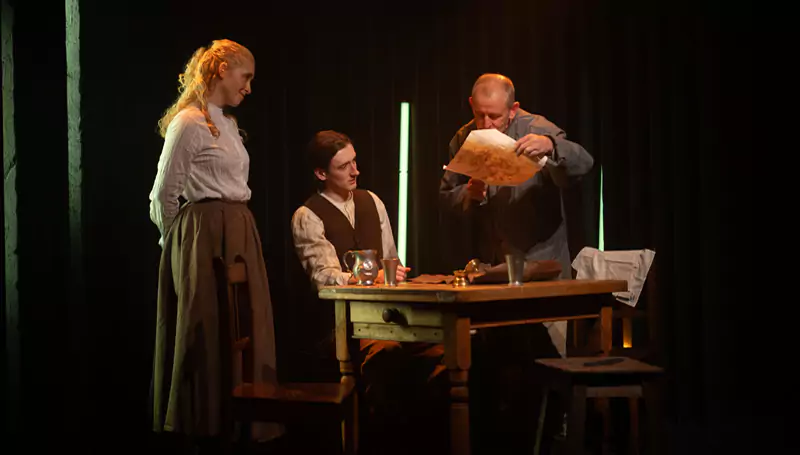“Tachwedd” (“November/The Slaughter”) at Theatre503
Tom Bolton in South London
21 October 2024
The title of Jon Berry’s new play is the Welsh word for November which, as well as the month, suggests a time of year when the mood darkens. In a rural context, it is also when the animals are fat enough to be slaughtered. The foreboding title is a fair representation of the drama, which is ambitious, era-spanning, and disturbing.
Set in a single location – a farmhouse somewhere near Trawsfynydd in Snowdonia – it takes place in five time periods, from pre-history to the present. The stories in each are connected by the influence, generally malign, of their shared place. The show opens with the cast of four scooping up handfuls of the earth and eating them, sending the unambiguous message that the place is within them, whether they want it or not.
The play concentrates on four stories: a young man trying to escape his farming inheritance in 1758; a grim tale of power and sexual abuse in 1902; worklessness and a failing marriage in 1975; and a writer winning fame by exploiting family tragedy in 2024.
The all-Welsh cast of four give appealing performances, and switch very effectively between their various roles, which are neatly indicated by small changes in costume. Saran Morgan plays a series of young women, always fighting back against expectations. The young men played by Bedwyr Bowen are trapped by society, place, and expectation, incapable of getting out. Carri Munn’s characters range from self-deluding and dangerous, to furious at the restrictions of place and society. Glyn Pritchard’s older men are similarly varied, by turns predatory, self-destructive, and possessing all the power and authority.
The set, by Rebecca Wood, is a crescent of tall slats which can channel blinding light towards the audience, or focus beams like a stone circle, connecting events beyond their time.
Jon Berry’s ambition is impressive, and Tachwedd is reminiscent of Alistair McDowall’s similarly time-hopping play The Glow. The impressionistic prehistoric scenes, involving a wild boar hunt, add an exciting element of the mysterious and undefined to the social history that powers the main scenes.
It is difficult to weave themes together across such large timespans, and the play’s thesis is not entirely clear. Berry’s describes the play as being like “a distintegration tape” running in a loop until it becomes “saturated” and falls apart. Events layer up in a single location across time, creating shadows that cannot be erased. However, the drama would benefit from stronger shared threads to justify the telling of these particular stories, than just the soil that connects them.
Nevertheless, Tachwedd gives us a defiantly unpretty social history of North Wales. It is a serious play that, despite its tragic events, has strong characters and humour too. Berry has fun, for example, unpicking the hypocrisies of literary agents. Well-managed by director Jac Ifan Moore, the play is an entertaining and often powerful evening which thoroughly defies expectations. It is also a testament to Theatre503’s crucial work developing new writing for the stage, and giving London exposure to creative artists from Wales.









